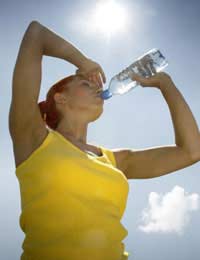Nutrition for Walking

As we’re all aware our bodies convert food that we consume into energy when we’re exercising and the more strenuous the exercise the greater the demand on our energy reserves. The amount of energy we need when out walking depends on a number of factors such as:
- Our weight
- Our age
- Our gender
- walking distance
- walking speed
- The height gain (altitude) of the walk
What Types of Food Should we Take on Board When Walking?
You will be using all manner of muscles when out walking and this means that you should be eating foods which are rich in carbohydrate predominantly and other foods which contain fatty acids and healthy sugars. If you don’t have enough carbohydrate particularly, then you’ll have to slow down your walk and, ultimately, stop altogether otherwise you’ll end up suffering from exhaustion due to a lack of energy. However, as mentioned above, there’s no exact science in working out just how much you’ll need to eat because of the many variables outlined above. When considering what specific types of food you should take, you’ll possibly have to also consider the weight you’ll be carrying on your shoulders if, for example, you are carrying a backpack. If that’s the case, you’ll want to take food which is light to carry but which can provide a lot of energy comparative to its size.For example, a typical lunch for a leisurely day’s walking might include a couple of cheese or peanut butter sandwiches, a bar of chocolate and, perhaps, some dried fruit, a cereal bar or a banana if you prefer.
The Importance of Water and Other Fluids
At the top of your nutritional requirements however, by far the most important is water. Keeping well hydrated is the key to your success on any walk, whether it’s long or short because exercise causes evaporation in the form of sweat in order for us to regulate our body temperature and, unless you quickly replace the loss of water through sweating by drinking more, you’ll become dehydrated. This means that you can no longer regulate your body temperature and this eventually results in heat exhaustion. It’s crucial to remember that being thirsty is not a good indicator of the possible onset of heat exhaustion. You should drink at regular intervals throughout your walk as thirst simply indicates that you’ve already lost a significant amount of fluid.Although drinking water is your best option, these days there are numerous isotonic drinks also available which not only put fluid back into your body but also improve the rate at which water can be absorbed by your body tissues. Whatever your fluid preferences, you should be aiming to drink a minimum of 2 litres a day but this will be far more depending on some of the factors discussed earlier.
Other Things to Consider
When out walking, you should be looking to abandon the principles of ‘three meals a day’. Eating ‘little and often’ should be your edict and always try to start the day with a decent breakfast, preferably eaten about an hour before you set off.Obviously, you’ll also need to adapt how much you eat the greater the distance of your walk and its level of intensity and there are plenty of useful resources online with suggestions for menus and foods to take for a range of walking distances and difficulties.- The Best Hiking Snacks
- Avoiding Leg Cramps When Walking
- Walking for Physical Rehabilitation
- How to Prepare for the Hiking Season
- Hiking for Older People
- Walking for Fitness: A Plan
- Fell Running: Is it for You?
- What is SwimHiking?
- Walking on Roads
- A Solo Walking Guide
- How To Avoid Blisters When Hiking
- General Health And Safety When Walking
- What to do in an Emergency
- Walking for Health
- Walking Injuries
- How to Prevent Walking Injuries
- How To Take Care Of Your Feet When Hiking


Re: Walking on Roads
I have never attempted any form of hiking. This year i am 87, I’m pretty’s fit, I walk with dog between five and. Six miles every day, summer and…
Re: Starting a Walking Club
Hi I'm a naturist from North Wales and wanted to reach out to people that would like to join a clothing optional walk what's the best way…
Re: Starting a Walking Club
Do I need insurance for a walk/run group?. It’s a completely free group so no joining fee or charges. It’s run by volunteers. I don’t…
Re: Join A Walking Club
I need to hike...do something for my self...I love the outdoors and hiking...I need to meet new friends...who injoys the outdoors like…
Re: Starting a Walking Club
What sort of paperwork/ registration/ insurance might you need for walking group?
Re: Join A Walking Club
Hi, Any advice on liability/protecting yourself when setting up a walking club? What if someone hurts themselves? Thanks, Sam
Re: Starting a Walking Club
Hello, Do you know of any software that facilitates putting together walking/hiking clubs programme schedule? I am looking for…
Re: Join A Walking Club
I am looking to join a walking/hiking club in the Southampton/Hampshire area. I am 50 and have signed up for London to Brighton Challenge and…
Re: Join A Walking Club
Looking for a short walk partner n to make friends in tipton area of west midlands
Re: Join A Walking Club
Hi I am 33 and am looking to join a walking club for health and social reasons. I currently live in huntingdonshire.